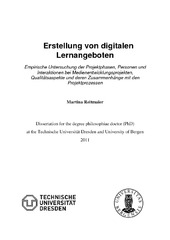Erstellung von digitalen Lernangeboten. Empirische Untersuchung der Projektphasen, Personen und Interaktionen bei Medienentwicklungsprojekten, Qualitätsaspekte und deren Zusammenhänge mit den Projektprozessen
Doctoral thesis
Permanent lenke
https://hdl.handle.net/1956/5963Utgivelsesdato
2012-05-25Metadata
Vis full innførselSamlinger
Sammendrag
This study focuses on the processes during a project for developing elearning modulesin universities, called media development projects. For the research of the projectprocesses the following three aspects are analyzed: the people who are involved intothe project, the project phases and the interactions between the involved people.Furthermore, the quality of the produced modules is assessed.In universities there are many projects for developing elearning modules. Theseprojects use different technology like hypertext or simulations. And the number of theteam members is also varying, some teams have only two members and others have 20.All these projects have one basis - they produce media for a learning context.Based on the three aspects persons, project phases and interactions the theoreticalbackground is chosen. The actor theory and the sociological role theories are thebackground for the analysis of the persons, who are involved into media developmentprojects. The research on the project phases is based on instructional design and mediadevelopment models. Furthermore, the interactions between the involved people areanalyzed on the basis of knowledge management, especially the transactive memorysystem, shared mental models, expert layperson communication and knowledgeintegration.The research questions are about the processes in a media development project: theroles which are taken by the involved persons, the phases of a media developmentproject and the collaboration within the roles. Furthermore, there occurs anotherquestion concerning the quality of the produced modules: which aspects of the projectprocesses influence the quality of the developed learning modules?For the research design there are chosen three media development projects as casestudies. The research design is based on triangulation and includes therefore threesteps: • Interview with the team members for analyzing the project processes• Messuring the quality of the developed elearning modules by a criteria checklist and an interview of the experts• Correlations between the project processes and the quality of the modules by aninterview with the expertsThe method for the interviews is based on the problem centered interview from Witzel(2000). The data is analyzed by the method of circular deconstruction from Jaeggi,Faas & Mruck (1998).For each case study the outcomes of the interviews with the team members arediscussed and a role model and a phases model is developed. Furthermore, the qualityof the developed modules is assessed and the experts, who are evaluating, expose linksand causes between the project processes and the evaluation outcomes.The last step of interpretation is to summarize and compare the results of the three casestudies. First, a role model for media development projects is build and the differentrealization possibilities are discussed. This model consists of the media developer,consultants from different expert fields, the technical support, learners, teachers, theproject manager and the quality manager. The project members have two differentviews on the media development: while some are learner oriented the others have aquite product oriented view on the development process.The project phases are realized differently in the three case studies. Two projects havepreliminary work for developing templates. In all three case studies they build a kindof prototype for the learning modules. The conception phase is done intensively in oneproject while the other two projects skip it partly. The implementation phase can beseen in all three case studies. In one project there is no phase for quality checks andthey have a quite linear procedure. Whereas in the other two case studies there arequality checks and they include a circular way of developing the modules.Furthermore, in those two projects the team members partly also have the metacompetence of self-reflection when proceeding in the process of media development. The result of the comparison of the three case studies is a model of risk and successfactors. There are three levels: the roles/actors, the project phases and the interactions.At the role/actor level the risk factors are the media developer role, the absence of thelearner role and the product oriented view whereas the success factors are theconsultant roles and the learner oriented view.On the level of project phases the linear proceeding, the absence of the qualitymanagement and the absence of the conception phase can be seen as risk factors.Success factors are circular proceeding and methods for quality assurance.A low level of collaboration is a risk factor at the level of interactions.When some risk factors occur together the hazard for the project increases. Whereassome success factors compensate some risk factors when they are adopted together.
